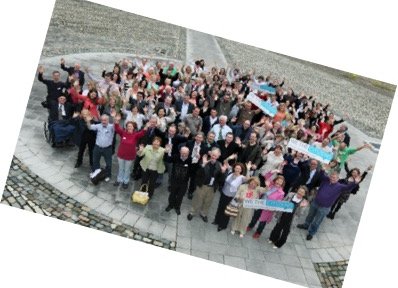We the Citizens is a democratic participatory project to ignite citizen involvement in democracy in Ireland. A pilot project found striking shifts in how participants feel about their ability to influence politics. The project tested whether a more participatory form of democracy could work in Ireland at a time when people felt adrift and disconnected from power. In the project, a representative group of citizens were randomly chosen to attend a Citizens’ Assembly in June 2011.
Innovation Summary
Innovation Overview
We the Citizens is a democratic participatory project to ignite citizen involvement in democracy in Ireland. The project tested whether a more participatory form of democracy could work in Ireland at a time when people felt adrift and disconnected from power. In the project, a representative group of citizens were randomly chosen to attend a Citizens’ Assembly in June 2011.
After the assembly, participants showed a greater interest in politics, expressed more willingness to discuss and become involved in politics, and felt more positive about the ability of ordinary people to influence politics. The findings persuaded leading politicians to introduce the methodology in a state sponsored Convention and it became a template for the Irish Constitutional Convention and later for the Citizen Assembly. Many of the team were also part of the Academic And Legal Support Group of the Convention and two were also involved with the Assembly.
Innovation Description
What Makes Your Project Innovative?
This was the first deliberative experiment in Ireland. It examined the possibility that randomly selected citizens could engage with complex policy trade-offs and come to sensible decisions. ‘We the Citizens’ is an independent initiative aimed at demonstrating how Ireland can benefit from its citizens engaging in new forms of public decision making. The objective is to test whether new forms of public decision making such as the national citizens’ assembly model could work in Ireland.
The national citizens’ assembly met on Saturday June 25th and Sunday June 26th 2011 in the Royal Hospital Kilmainham. It was made up of a cross-section of Irish society and those who attended were selected randomly and independently by IPSOS MRBI – a polling company.
Innovation Development
Collaborations & Partnerships
We the Citizens was run by a number of political scientists: Professor David Farrell of UCD; Dr Jane Suiter of DCU; Dr Eoin O’Malley of DCU; and Dr Elaine Byrne. It was funded by Atlantic Philanthropies. The board was chaired by Fiach Mac Conghail, Director of the Abbey Theatre and Independent Senator . The Executive Director was Caroline Erskine . Soem 100 citizens were randomly recruited to the mini public.
Users, Stakeholders & Beneficiaries
Citizens were randomly recruited through a polling company
Civil society and academia were involved as expert presenters on the topics at issue
Innovation Reflections
Results, Outcomes & Impacts
The final reprot was presented to to all political party leaderships.
At the following 2011 election almost all parties had promises of some form of citizen assembly in their manifestos.
The subsequent Programme for Government negotiated between Fine Gael and Labour made provision for a Constitutional Convention based on the model.
This Convention recommended both marriage equality and a referendum on the issue among many other provisos. This was subsequently passed by the people. A Citizen Assembly followed and there have been renewed political discussions on a further assembly.
Challenges and Failures
The most significant challenge was securing the very generous funding from Atlantic Philanthropies which allowed this experiment to happen.
This addressed the other major challenges in introducing deliberative democracy to Ireland: the skepticism at governmental level that randomly selected citizens could in fact be trusted to make complex decisions.
Conditions for Success
1. Set clear objectives, develop a plan
– Make sure to work with a reputable polling company to ensure that the citizens are in fact both randomly selected and representative. Work hard to ensure that the selected citizens are keen to participate and make regular contact to minimise drop off.
2. Ensure buy-in and support
- We the Citizens was back by Atlantic Philanthropies who provided financial support not only for recruitment but for hosting 100 citizens at a hotel over a weekend. Consider paying a small honory amount and childcare support
3. Engage
invest in a good website; in a videographer who can capture the citizens' perspective and ensure taht all briefing materials are easy to understand and balanced.
Replication
The format was replicated by the Irish government at the Constitutional Convention and the Citizen Assembly. Other areas and districts are considering similar innovations.
Lessons Learned
Be very careful with recruitment to make sure it is above reproach.
Pay attention to the citizens and make them valued and welcome.
Pay attention to having independent experts.
Bring in civil society and legal expertise as inputs and not participants.
Engage with the media and let them see the process; be as transparent as possible.
Engage with politicians; this is a bonus for representative democracy not a replacement.
Project Pitch
Supporting Videos
Date Published:
9 April 2011

